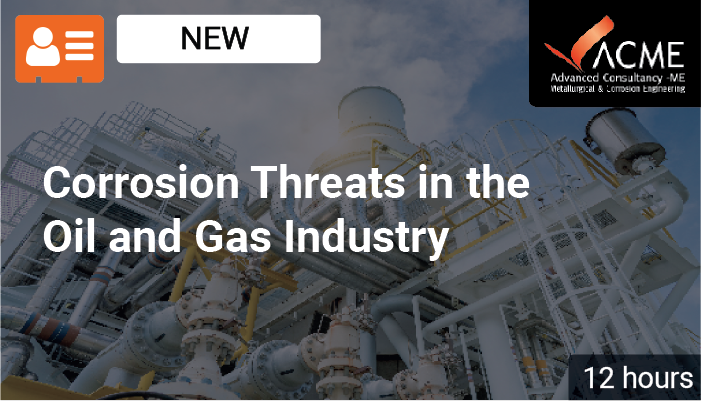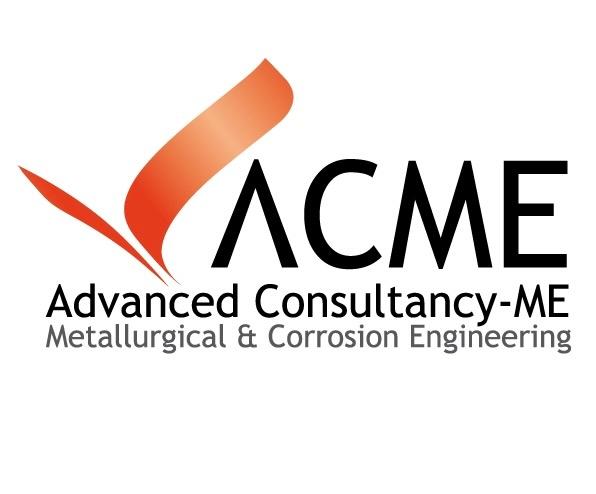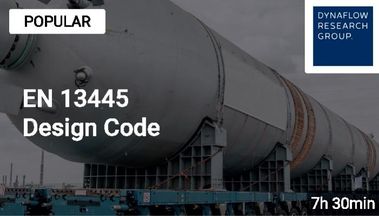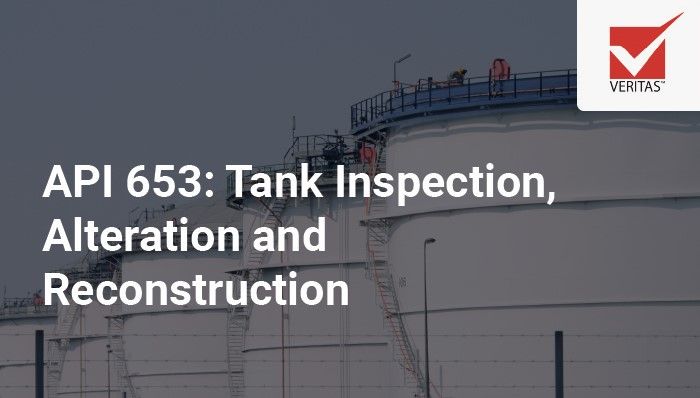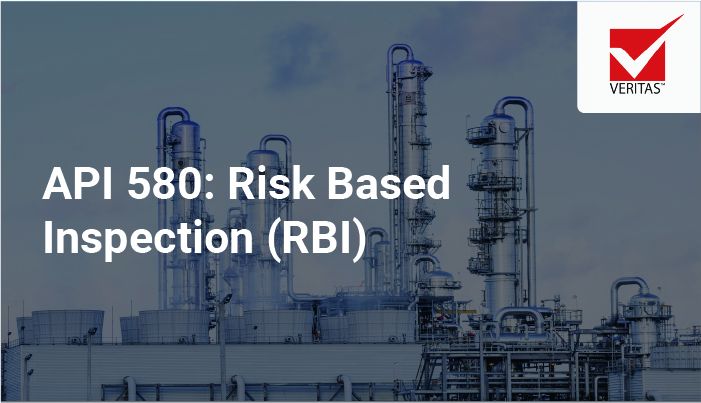Corrosion Threats in the Oil and Gas Industry
Join the Program
Virtual or Classroom
12hr Content
2 Day program
Registration deadline: 15 July 2024
Custom Scheduling
Mimoun Elboujdaini
INCO3105
Format:
Instructor-led
Join the Program
To register multiple team-members at once, use the link below.
Need a dedicated version of this program for your team? Please contact us.
Course Objective
“To give participants a fundamental understanding of the different corrosion mechanisms that occur in oil and gas production and processing facilities.”
Private course for team
Custom scheduling
Industry Expert
On-site or virtual
1-year unlimited access
to up-to-date course materials
PDH Hours qualified course
Read more here
About the course
In-Company
Live sessions
12 hr Content
Custom
English
INCO3105
Corrosion poses a significant threat to the infrastructure and operations of the oil and gas industry. The destructive nature of corrosion can compromise the integrity of equipment, pipelines, storage tanks, and other critical assets, leading to safety hazards, environmental risks, and financial losses.
This course will focus on identifying specific corrosion threats that are commonly encountered in the industry. Participants will learn about the various types of corrosion, such as uniform corrosion, pitting corrosion, stress corrosion cracking, and hydrogen-induced cracking. The course will also cover corrosive environments and factors that contribute to accelerated corrosion.
By the end of the course, participants will have a thorough understanding of corrosion threats in the oil and gas industry and other industry sectors, as well as the knowledge and skills necessary to develop effective corrosion management strategies and practices.
The course consists of 12hr of live sessions with the instructor. All training content is provided through your EngineeringTrainer account. After the course you maintain 1-year unlimited access to the course, including any new course material. This allows you to perform modules again should you need to refresh your knowledge.
Questions? Contact us
hello@engineeringtrainer.com
+31 (0)85 058 0051
Monday - Friday, 9am - 6pm CEST

Meet your instructor
Program & Details
Corrosion resulting from dissolution of corrosive gases in brines
Hydrogen sulfide (H2S sour)
Carbon Dioxide (CO2 sweet)
Internal corrosion of equipment due to the presence of carbon dioxide (sweet corrosion) and/or hydrogen sulfide (sour corrosion).
Low temperatures, less than 150C; electrolyte formation
Higher temperatures; corrosion reactions involving gas phase reactions
Effect of pressure on CO2 corrosion
Effect of fluid flow on CO2 corrosion
Sour corrosion - H2S
Corrosion due to H2S and CO2
Hydrogen Embrittlement / Cracking
Hydrogen induced cracking (HIC) & Hydrogen blistering
Stress orientated hydrogen induced cracking (SOHIC)
Sulfide stress cracking (SSC)
Erosion Corrosion
Cavitation Damage
Corrosion Fatigue
Stress Corrosion Cracking
Carbonate/bicarbonate cracking
Common problems
Construction
Hydrotest fluids
Dewatering
Lay-up
Oxygen ingress
Results
After this course, you...
will have learned about different types of corrosion applicable to the oil and gas industry, such as uniform corrosion, pitting corrosion, and stress corrosion cracking, and understand the specific conditions that promote each type.
understand the various Corrosion Monitoring Techniques such as visual inspection, non-destructive testing methods, and chemical analysis and how these can be used in practice.
know how corrosion can be prevented or mitigated through material selection, coatings and linings, cathodic protection systems, and chemical inhibitors.
have seen a number of detailed case studies; to understand the causes of corrosion incidents, their consequences, and the lessons learned.
have the skills to play a proactive role in managing corrosion risks in your facility.
have enhanced your professional competence in materials science and engineering.
Who should attend this course
Those wanting to gain a comprehensive understanding of the corrosion mechanisms in oil and gas facilities:
Engineers and Technicians; Asset and Facility Managers
Inspection and Maintenance Personnel
Health, Safety, and Environment (HSE) Professionals
Project Managers and Consultants
Regulatory and Compliance Personnel
Prerequisites:
Participants are expected to have a basic understanding of engineering principles and some familiarity with corrosion. A background in mechanical engineering, chemical engineering, materials engineering, or corrosion engineering is beneficial.
Level: Intermediate
Live sessions
This course consists of instructor-led group sessions, these group sessions can be Virtual or Onsite. During these sessions participants can ask questions to the instructor which are discussed, as well as questions submitted beforehand in the learning portal.
After each live session used slides and exercise documents are made available to participants on the learning portal. Please note that for privacy reasons no recordings of the live sessions are made or provided. You receive 1-year unlimited access to the online course material. This allows you to review content again if this is beneficial for your daily work activities and benefit from any material updates.
The live sessions are scheduled together with the customer and are private for their team only.
Typically the training course would be scheduled as:
Virtual: 4 sessions of 3 hours each
Onsite: 2 days of 6 hours
After the course participants receive 1-year unlimited access to the slides and exercise documents used within the sessions via the learning portal. This allows them to review material when required to refresh their knowledge for daily work activities.
A personal digital certificate will be made available to each participant upon full attendance.
Example Certificate:
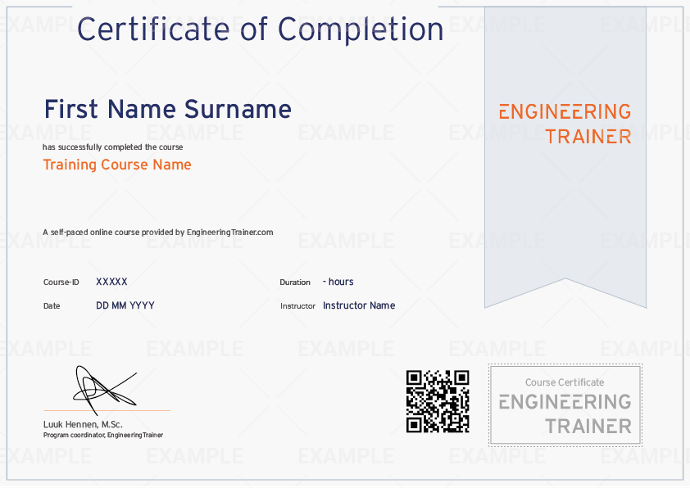
FAQ
This course consists of instructor-led live sessions which consist of presentations, demonstrations and discussions of questions. During each live session participants can ask questions to the instructor (through chat or microphone) which will be answered.
Please note that for privacy reasons no recordings of the live sessions are made or provided.
The training material used in the live sessions, for example the slides or exercises, will be available in the EngineeringTrainer portal for a year after the date of the training allowing you to refresh your knowledge or review material if needed.
No, course content is not available for download.
The training material used in the sessions, for example the slides or exercises, will be available in the EngineeringTrainer portal for a year after the date of the training allowing you to refresh your knowledge or review material if needed.
Please note that for privacy reasons no recordings of the live sessions are made or provided.
Yes, interactive Q&A sessions are part of the live sessions in this course and allow you to interact with the instructor and ask questions.
To respect the privacy of the participants the live sessions will not be recorded, and as such the live sessions cannot be played back. Therefore it is important for all participants to block the time slots of the live sessions in their calendars and be present.
No software licenses are provided as part of this course.
Yes, this course qualifies for PDH hours as per the NCEES CPC Guidelines.
Related Courses
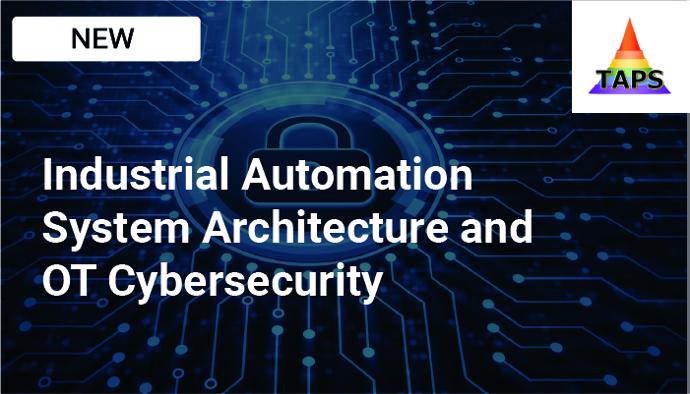
Virtual or Classroom upon request
Industrial Automation System Architecture and OT Cybersecurity
